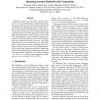Free Online Productivity Tools
i2Speak
i2Symbol
i2OCR
iTex2Img
iWeb2Print
iWeb2Shot
i2Type
iPdf2Split
iPdf2Merge
i2Bopomofo
i2Arabic
i2Style
i2Image
i2PDF
iLatex2Rtf
Sci2ools
121
click to vote
HOTOS
2009
IEEE
2009
IEEE
Operating Systems Should Provide Transactions
Operating systems can efficiently provide system transactions to user applications, in which user-level processes can execute a series of system calls atomically and in isolation from other processes on the system. The effects of system calls performed during a system transaction are not visible to the rest of the system (other threads or hardware devices) until the transaction commits. This paper describes TxOS, a variant of Linux 2.6.22, which is the first operating system to implement system transactions on commodity hardware with recent techniques from the transactional memory literature. The paper demonstrates that system transactions can solve problems in a wide range of domains, including security, isolating extensions, and user-level transactional memory. We also show that combining semantically lightweight system calls to perform heavyweight operations can yield better performance scalability: for example, enclosing link and unlink within a system transaction outperforms rena...
Related Content
| Added | 16 Aug 2010 |
| Updated | 16 Aug 2010 |
| Type | Conference |
| Year | 2009 |
| Where | HOTOS |
| Authors | Donald E. Porter, Emmett Witchel |
Comments (0)

